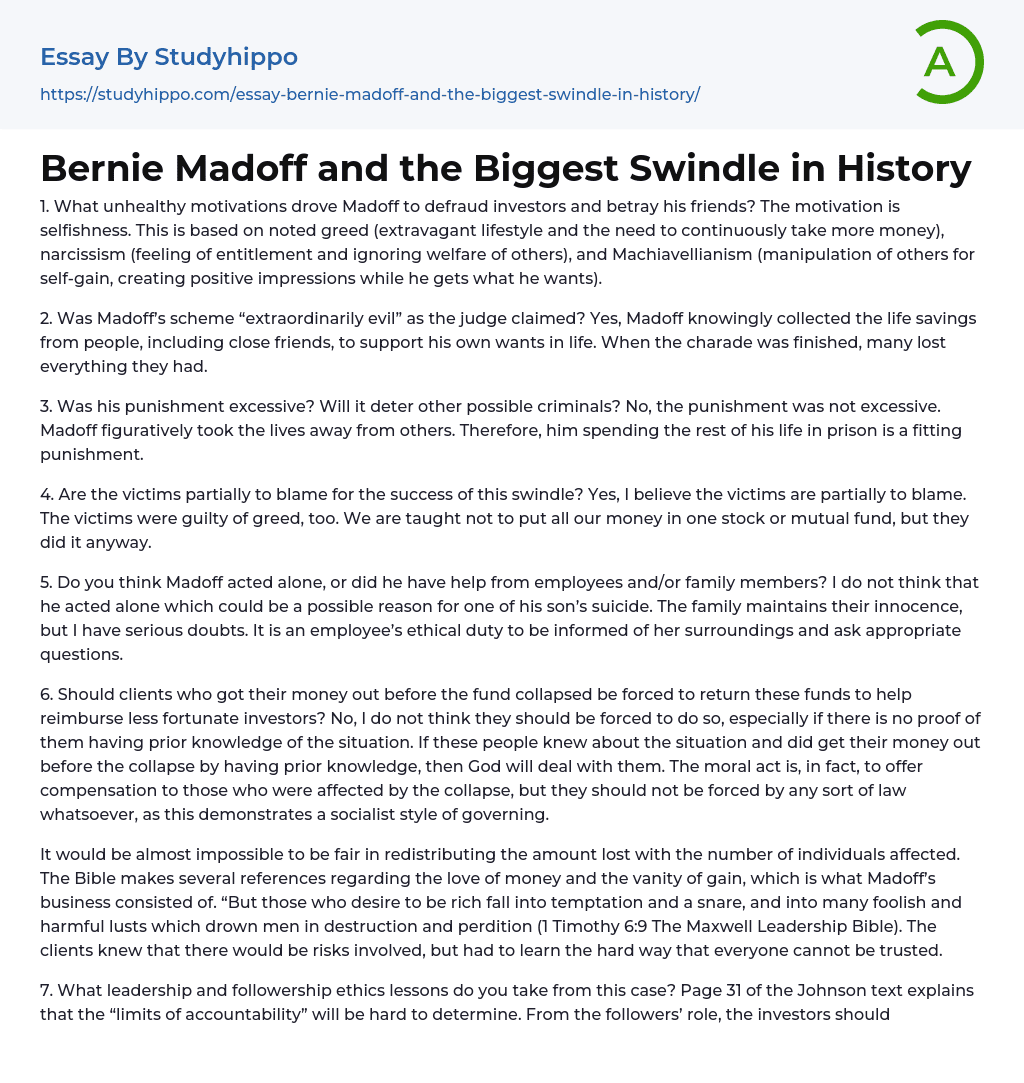

Bernie Madoff and the Biggest Swindle in History Essay Example
1. What unhealthy motivations drove Madoff to defraud investors and betray his friends? The motivation is selfishness. This is based on noted greed (extravagant lifestyle and the need to continuously take more money), narcissism (feeling of entitlement and ignoring welfare of others), and Machiavellianism (manipulation of others for self-gain, creating positive impressions while he gets what he wants).
2. Was Madoff’s scheme “extraordinarily evil” as the judge claimed? Yes, Madoff knowingly collected the life savings from people, including close friends, to support his own wants in life. When the charade was finished, many lost everything they had.
3. Was his punishment excessive? Will it deter other possible criminals? No, the punishment was not excessive. Madoff figuratively took the lives away fr
...om others. Therefore, him spending the rest of his life in prison is a fitting punishment.
4. Are the victims partially to blame for the success of this swindle? Yes, I believe the victims are partially to blame. The victims were guilty of greed, too. We are taught not to put all our money in one stock or mutual fund, but they did it anyway.
5. Do you think Madoff acted alone, or did he have help from employees and/or family members? I do not think that he acted alone which could be a possible reason for one of his son’s suicide. The family maintains their innocence, but I have serious doubts. It is an employee’s ethical duty to be informed of her surroundings and ask appropriate questions.
6. Should clients who got their money out before the fund collapsed be forced to return these funds to help
reimburse less fortunate investors? No, I do not think they should be forced to do so, especially if there is no proof of them having prior knowledge of the situation. If these people knew about the situation and did get their money out before the collapse by having prior knowledge, then God will deal with them. The moral act is, in fact, to offer compensation to those who were affected by the collapse, but they should not be forced by any sort of law whatsoever, as this demonstrates a socialist style of governing.
It would be almost impossible to be fair in redistributing the amount lost with the number of individuals affected. The Bible makes several references regarding the love of money and the vanity of gain, which is what Madoff’s business consisted of. “But those who desire to be rich fall into temptation and a snare, and into many foolish and harmful lusts which drown men in destruction and perdition (1 Timothy 6:9 The Maxwell Leadership Bible). The clients knew that there would be risks involved, but had to learn the hard way that everyone cannot be trusted.
7. What leadership and followership ethics lessons do you take from this case? Page 31 of the Johnson text explains that the “limits of accountability” will be hard to determine. From the followers’ role, the investors should have made themselves more available to what was going on with their money. Perhaps more time should have been spent in prayer before giving up an entire life’s savings to Madoff with the hopes of miraculous wonders. I do believe that most of Madoff’s business followers were
aware of what was happening.
Despite the risks, the ethical thing to do was to confront Madoff, report the situation, and pray for God to take over, as this would avoid acting “arbitrarily and unfairly” with shadows arising (Johnson. 2012, p. 30). Some of these people will have a guilty conscience for the rest of their life because they hid the bad news, denied responsibility, or shifted blame, which resulted in a high price paid (p. 29). I pray that Madoff’s business associates find a better role model in the future and realize that moral work is never ending.
- Values of Life essays
- Ethical dilemma essays
- Normative Ethics essays
- Virtue Ethics essays
- Belief essays
- Deontology essays
- Moral essays
- Virtue essays
- Work Ethic essays
- Russian Empire essays
- Ancient Greece essays
- British Empire essays
- Historical Figures essays
- Nazi Germany essays
- Roman Empire essays
- War essays
- Revolution essays
- 19Th Century essays
- Historiography essays
- History of the United States essays
- 20Th Century essays
- World History essays
- Vikings essays
- Declaration of Independence essays
- Civilization essays
- Evidence essays
- Genocide essays
- Colonialism essays
- Rebellion essays
- 1960S essays
- 1920S essays
- 1950S essays
- Letter from Birmingham Jail essays
- Louisiana Purchase essays
- The Columbian Exchange essays
- World Hunger essays
- What is History essays
- Bravery essays
- Gilded Age essays
- Vladimir Lenin essays
- Alexander The Great essays
- Sparta essays
- Victorian Era essays
- Henry v essays
- Stonehenge essays
- Frederick Douglass essays
- Mahatma Gandhi essays
- Joseph Stalin essays
- Geert Hofstede essays
- George Eliot essays



